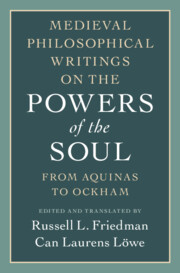Book contents
- Frontmatter
- Contents
- Acknowledgments
- Sources of the Translated Texts
- Notes on the Translations
- List of Abbreviations, Symbols, and Conventions
- Introduction:
- 1. Bonaventure (d. 1274), Commentary on the Sentences, book II, d. 24, a. 2, q. 1:
- 2. Albert the Great (d. 1280), Summa theologiae, book I, treatise 3, q. 15, chap. 2, a. 2, c. 1:
- 3. Thomas Aquinas (d. 1274), Commentary on the Sentences, book I, d. 3, q. 4, a. 2:
- 4. Henry of Ghent (d. 1293), Quodlibet III, q. 14 (excerpts):
- 5. Godfrey of Fontaines (d. ca. 1306), Quodlibet II, q. 4:
- 6. Thomas of Sutton (d. ca. 1315), Ordinary Question 4 (excerpts):
- 7. Peter of John Olivi (d. 1298), Questions on the Sentences, book II, q. 54 (excerpts):
- 8. John Duns Scotus (d. 1308), Commentary on the Sentences (Reportatio A), book II, d. 16:
- 9. James of Viterbo (d. 1308), Quodlibet I, q. 7, doubt 1:
- 10. Durand of St.-Pourçain (d. 1334), Commentary on the Sentences (Third Version), book I, d. 3, part 2, q. 2:
- 11. William Ockham (d. 1347), Commentary on the Sentences (Reportatio), book II, q. 20
- Glossary of Terms
- Glossary of Arguments
- Bibliography
- Index
Introduction:
The Latin Medieval Debate about the Relation between the Soul and Its Powers
Published online by Cambridge University Press: 10 April 2025
- Frontmatter
- Contents
- Acknowledgments
- Sources of the Translated Texts
- Notes on the Translations
- List of Abbreviations, Symbols, and Conventions
- Introduction:
- 1. Bonaventure (d. 1274), Commentary on the Sentences, book II, d. 24, a. 2, q. 1:
- 2. Albert the Great (d. 1280), Summa theologiae, book I, treatise 3, q. 15, chap. 2, a. 2, c. 1:
- 3. Thomas Aquinas (d. 1274), Commentary on the Sentences, book I, d. 3, q. 4, a. 2:
- 4. Henry of Ghent (d. 1293), Quodlibet III, q. 14 (excerpts):
- 5. Godfrey of Fontaines (d. ca. 1306), Quodlibet II, q. 4:
- 6. Thomas of Sutton (d. ca. 1315), Ordinary Question 4 (excerpts):
- 7. Peter of John Olivi (d. 1298), Questions on the Sentences, book II, q. 54 (excerpts):
- 8. John Duns Scotus (d. 1308), Commentary on the Sentences (Reportatio A), book II, d. 16:
- 9. James of Viterbo (d. 1308), Quodlibet I, q. 7, doubt 1:
- 10. Durand of St.-Pourçain (d. 1334), Commentary on the Sentences (Third Version), book I, d. 3, part 2, q. 2:
- 11. William Ockham (d. 1347), Commentary on the Sentences (Reportatio), book II, q. 20
- Glossary of Terms
- Glossary of Arguments
- Bibliography
- Index
Summary
The introduction describes the scholastic Latin debate over the relation between the soul and its powers in the late thirteenth and early fourteenth century. It shows that this debate concerned the question of how a living being’s natural kind, which is determined by its soul, and its kind-specific powers are related. Is a living being’s soul the very same thing as its kind-specific powers, or is its soul perhaps something more basic upon which its kind-specific powers depend? The introduction shows that there were two overarching answers to this question in the thirteenth and fourteenth century: the identity theory, according to which the soul and its powers are identical, and the distinction theory, according to which the soul is distinct from its powers. The introduction first highlights that the debate between identity and distinction theorists already arose in the twelfth century in response to Augustine’s doctrine of the image of the Trinity. It then traces, in broad strokes, the development of the debate from the twelfth century until 1250. Finally, it discusses the phase between 1250 and 1320 focusing on the reception of Aristotle’s theory of the soul in the Latin West.
Keywords
- Type
- Chapter
- Information
- Medieval Philosophical Writings on the Powers of the SoulFrom Aquinas to Ockham, pp. 1 - 40Publisher: Cambridge University PressPrint publication year: 2025

